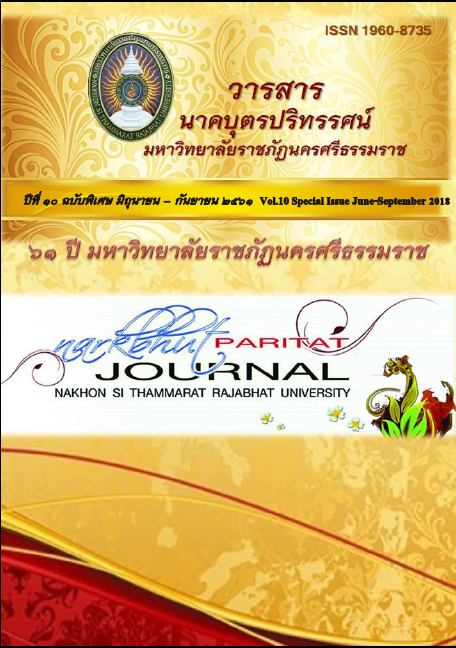Students’ English Pronunciation skill Development through Using Additional English Pronunciation Exercises of the M.2 Students at Muang Somdet School
Main Article Content
Abstract
Abstract
The purposes of this study are (1) to compare the learning outcome of the students who use additional English pronunciation exercise between the pre-test and post-test and, (2) to examine the attitudes towards English pronunciation via additional English pronunciation exercises.
The participants in this study were 30 students at Matthayom 2 who were studying in second semester of academic year 2016 at Muang Somdet School, Kalasin province. The study choose 30 participants from total 120 students by using purposive sampling method. The research instruments comprised of the study are additional English pronunciation exercises, the pronunciation of pre-test and post-test and attitudes questionnaire.
Data collection was conducted for 2 hours a week and spent time for 10 weeks in total. The pre-test was used before the experiment to obtain the base scores. During the experiment, the students were trained by additional English pronunciation exercises. After that the students were tested for the outcome by the post-test to assess the improvement. The data was analyzed by the statistic including the percentage, mean, standard deviation, and t-test.
The finding of the study revealed that the mean score of the pronunciation post-test was significantly higher than the mean score of the pre-test at p<0.05. Students pronounced words more correctly. It showed that students have confidence on pronunciation and have good attitude about learning speaking through practicing with additional English exercises.
Article Details
References
Chaloeisub, S. (1988). Reading Development. Pathumtani.
Gover, J., & Stacey, S. (2002). Oral Language and code-related precursors to reading:
Evidence from a longitudinal structural model, Developmental Psychology, Vol 38(6),
Nov. 2002, 934-947
Kewley, D., & Dalby, J. (1999). Explicit Pronunciation Training Using Automatic Speech
Recognition Teachnology, Vol. 16, No. 3, Special Issue: Tutors that Listen: Speech
Recognition for Language Learning (1999), pp. 425-445
Lord, G. (1999). How Can We Teach Foreign Language Pronunciation? On the Effects of a
Spanish Phonetics Course, Vol. 88, No. 3 (Sep., 2005), pp. 557-567, Published by
American Association of Teacher.
Lord, G. (2008). Podcasting Communities and Second Language Pronunciation. Pennsylvania
State, Pennsylvania Pressed.
Louise Spear-Swering. (2009). Learning Problems and Words Spelling on Secondary Students. [Webblog]. Received from http://www.braille-cet.in.th
Rasinski, T., & Zutell, J. (2009). Training Teachers to Attend to Their Students’ Oral Reading
Fluency. Vol 30, P. 211-217, Theory Into Practice Pressed.
Torai, S. (2014). Development Reading English Pronunciation Skill Through Additional
Exercises for M1 Students. Hatyai: Hatyai University.
Tedtom, T. (2009). Development Reading Skill and Spelling on Basic Words for Elementary
School by Using Additional exercises. Dissertation, Mahasarakham.

